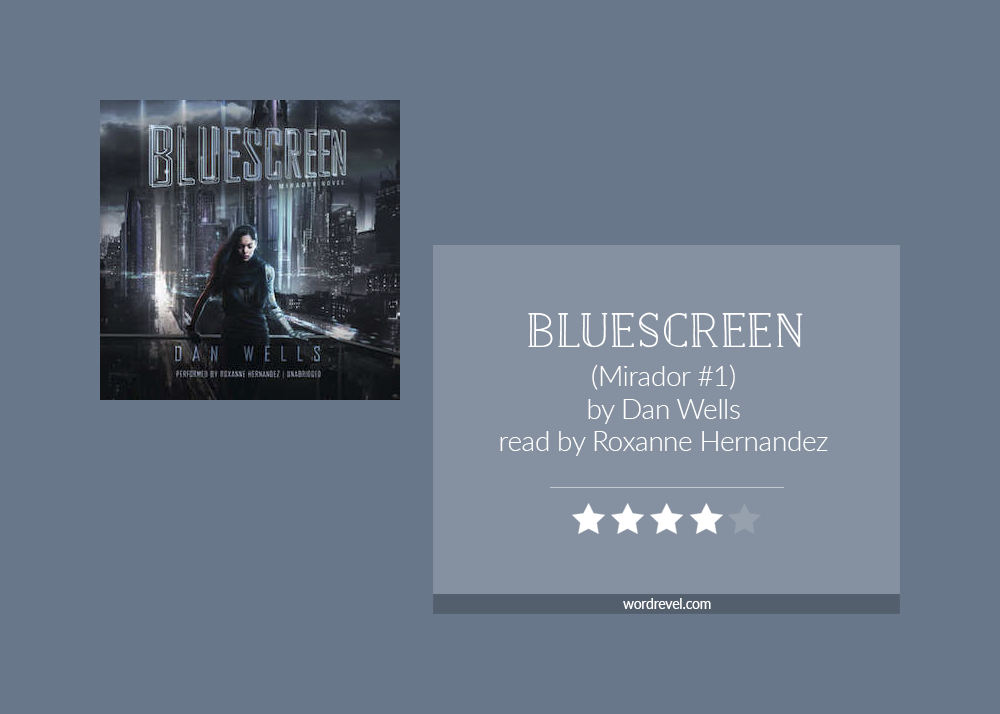 Bluescreen (Mirador #1) by Dan Wells • read by Roxanne Hernandez for 11 hours and 2 minutes • published February 16, 2016 by HarperAudio, HarperCollins Publishers • classified as Science Fiction, Mystery, Young Adult • obtained through purchase • read as audiobook • shelve on Goodreads
Bluescreen (Mirador #1) by Dan Wells • read by Roxanne Hernandez for 11 hours and 2 minutes • published February 16, 2016 by HarperAudio, HarperCollins Publishers • classified as Science Fiction, Mystery, Young Adult • obtained through purchase • read as audiobook • shelve on Goodreads Synopsis:
Los Angeles in 2050 is a city of open doors, as long as you have the right connections. That connection is a djinni - a smart device implanted right in a person's head. In a world where virtually everyone is online 24 hours a day, this connection is like oxygen - and a world like that presents plenty of opportunities for someone who knows how to manipulate it.
Marisa Carneseca is one of those people. She might spend her days in Mirador, but she lives on the net - going to school, playing games, hanging out, or doing things of more questionable legality with her friends, Sahara and Anja. And it's Anja who first gets her hands on Bluescreen - a virtual drug that plugs right into a person's djinni and delivers a massive, nonchemical, completely safe high. But in this city, when something sounds too good to be true, it usually is, and Mari and her friends soon find themselves in the middle of a conspiracy that is much bigger than they ever suspected.
Bluescreen was a fast-paced mystery rooted in science fiction. Set in the near future, the setting felt immediate yet very much more advanced. A lot of the communication technology and technology as a whole reflected current imaginations of what could be possible in a couple of decades. I thought Bluescreen tapped on that technological knowledge very well and injected some creativity as well.
Future of Communications
Constant connectivity was taken to a new level with this book. The characters experienced augmented reality directly in their head, heightening their perceptive abilities. At the same time, they still relied on their handheld devices, just as we do today. Marisa depended on technology to keep her connected to her friends in Los Angeles, as well as from around the world.
I loved how vividly Wells portrayed these friendships on an international scale. Despite the ease with which we can connect with others through the Internet, there still is the underlying notion of online versus IRL (in real life) friends. Bluescreen moved way past that divide and ensured that even if someone wasn’t physically present, they still were integral to the plot.
The international cast naturally gave rise to a multiethnic mix of character. The main character herself was Latina. I though Marisa’s culture was well-integrated through her family’s involvement. What made me smirk was her tendency to launch into Spanish when she was angry. That’s a very accurate portrayal of a bilingual person raised in a multicultural environment.
Gaming
While I’m not a gamer at all, I thought it’s worth mentioning that gaming is a huge part of Bluescreen. This offered a common platform and goal for Marisa and her friends as they also took part in competitions. The descriptions were pretty excited, considering that I felt rather engrossed in these fictitious games.
Mystery
Even though the synopsis references a potential conspiracy, I didn’t realize that Bluescreen is a science fiction mystery. That made it a lot more heart-stopping than I bargained for. At the same time, that made it all the more thrilling. Marisa treated her gaming competitions as life-or-death situation. As a result, the dangers that she encountered offline felt even more immediate.
Narration
For some reason, I wasn’t really feeling the narration. Roxanne Hernandez delivered the story effectively but I didn’t particularly like the way she narrated characters’ voices. Initially her normal narration annoyed me a little as well. Thankfully I got used to it fairly quickly. In the end, I had a fairly neutral disposition towards the narration. It didn’t add anything for me but it didn’t take anything away either. Nonetheless, I will probably read the ebook version of the sequel instead.

Wow, I had no interest in this book before, but now I’m DEFINITELY interested!! This definitely sounds interesting. I think I’ll steer clear of the audio though, and read the physical copy instead if I decide to give it a go. Great review! :)
I’m so excited I read this one now! Great review!